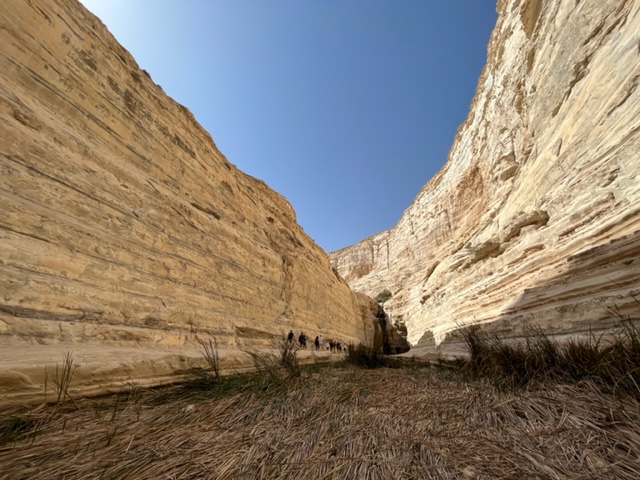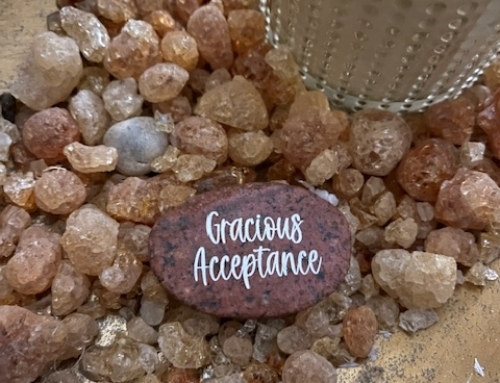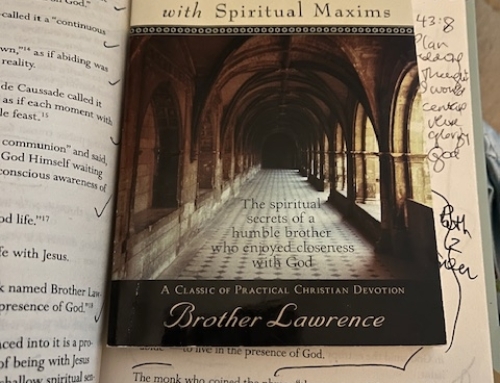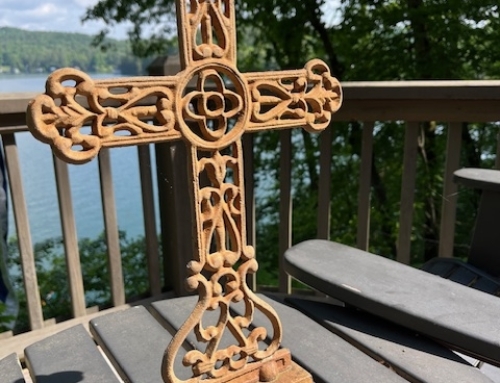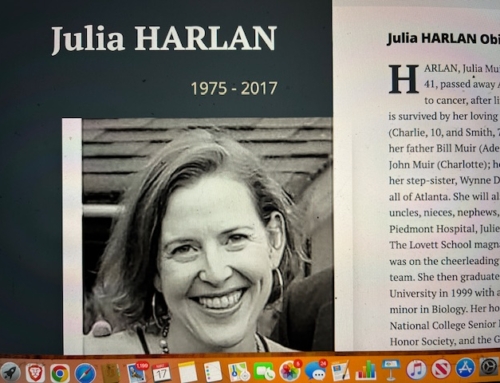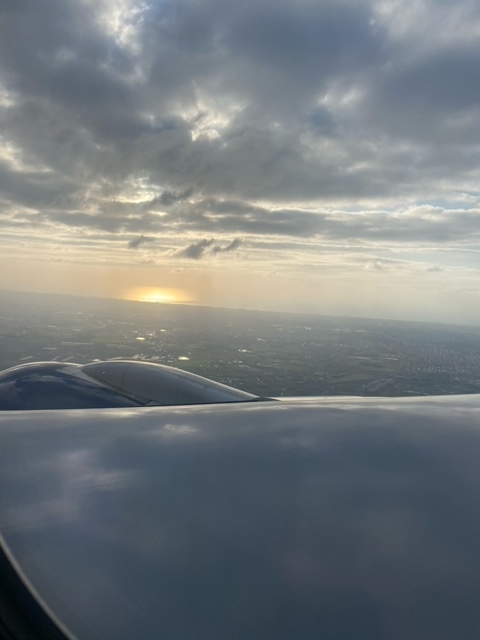
Good morning…
After being dropped off at the airport around 4:00 pm in Atlanta, we arrived in Tel Aviv, Israel just as the sun was setting. With the seven hour time change, our travel evaporated an entire day. My husband Steve shared with me the sketchy notes from which he will teach each day, and I will put flesh on their bones, adding adjectives, full sentences, and punctuation. I invite you to join our journey through the Holy Land, vicariously.
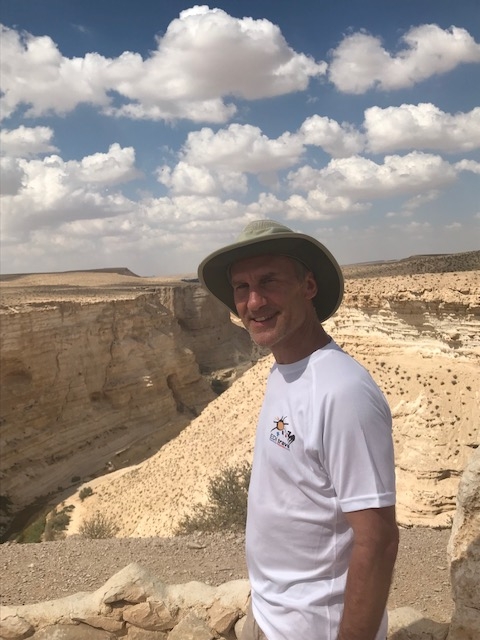
******
Day 1 – Saturday March 5 – notes from Rev. Steve Allen
The Wilderness of Zin- Ein Avdat – Numbers 14: 26-35, Deuteronomy 26:1-11, Isaiah 43:19
Bedouin Lunch- Abraham’s Hospitality- Genesis 18:1-8
Arad 2 Kings 18:4, 22
Our word of today is dabar. This is the root word in Hebrew for desert.
We are starting in the desert because it is one of the great metaphors for the both the Holy Land of Israel (which is 60% desert) and the relationship between God and his people. We wake today in a land where the love story between God and his people begins and continues to take shape.
One fascinating thing about Hebrew is that there were no vowels, so the words and the metaphors were open to interpretation. When you think of desert what do you think? Dry. Barren. Wasteland. Hot. Miserable. The desert is an infertile, barren, desolate place. The root word for desert is DBR, which can be interpreted as a dry, barren wasteland, literally a disaster. And yet, the word in dabar can also be interpreted as word. Depending on your own experiences of the desert, either of these interpretations can ring true. You can have a miserable experience or you can listen attentively and hear a word from God. It can be a miserable experience or it can teach you something new, fresh, life-giving.
Abraham was a wanderer, from Ur to Canaan. He came in from the north, but he didn’t settle in a Canaanite city, in the north. Rather he came here to the desert, passing through from Haran in the north to Shechem, to Bethel, to Beersheba, which can be translated “well of seven springs” or “well of the oath,” a place where Abraham made a key covenant with God. We wake in a hotel in Beersheba today before we trek into the deserted desert. Intuitively Abraham seemed to know that something about the desert was crucial to his love affair with God. In turn, he bequeathed to his descendants an appreciation for lessons taught by the desert.
The Hebrew people were a desert people. They had to learn to work the desert to ultimately to survive, even thrive, to lean on God for their sustenance, not on themselves. The people of Israel admired and honored those who could survive and thrive the desert. “Making the desert bloom” is Israel’s mantra. They didn’t bemoan the desert. They embraced it. It was in their DNA. For them, deep dependency on the provision of God and the truths taught in the desert were inseparable. Any influential prophet or king spent long lonely seasons fasting upon God in the desert.
Many shepherds also tended their flock in the desert, finding their way to hidden springs of water and feeding on the dry desert brush known as “milk and honey.” Today we may even see some nomadic shepherds guiding their flock of sheep through the arid terrain. David himself was a shepherd before he was chosen by God to be king. He understood the deep dependency engendered between a shepherd and their vulnerable sheep. He wrote his most famous psalm through the eyes of one single sheep.
The Lord is my shepherd.
I will always have everything I need.
He gives me green pastures to lie in.
He leads me by calm pools of water.
He restores my strength.
He leads me on right paths to show that he is good.
Even if I walk through a valley as dark as the grave,
I will not be afraid of any danger, because you are with me.
Your rod and staff comfort me.
You prepared a meal for me in front of my enemies.
You welcomed me as an honored guest.
My cup is full and spilling over.
Your goodness and mercy will be with me all my life,
and I will live in the Lord’s house a long, long time (Psalm 23:1-6, ERV).
Might this be why Jesus himself was led by the Spirit straight into the desert after his baptism at age thirty? Eremos is the word used here in Greek, which also means desert. A deserted place. A solitary place. A quiet place. Jesus was held for forty days and forty nights in a deserted, solitary, quiet place with God, fasting from comfort, company, convenience. The Lenten season we are now celebrating in the worldwide Christian church mirrors these spiritually transformative forty days leading up to Easter morning.
Someone once asked Steve, “What is the hardest part of working in the Buckhead community of Atlanta, teaching at The Lovett School?” The hardest thing, he replied, is that in our community we have an overabundance of what we want and need. With so many pleasant distractions filling our lives, we can deny the fact that we are designed for complete dependency upon God. As humans we resist discomfort, but discomfort can be a very important teacher. Suffering reshapes us and deepens us into our own intimate love affair with the Good Shepherd.
When we’re in the desert of the Holy Land today, might we actually feel closer to God than ever before? In the dry, desolate places of our lives, we realize that we need to rely on the sustaining love of the LORD.
Think with me now. In some part of your life back home, do you feel like you’re in the dry desert right now? Is life beating down on you? Abraham, the people of Israel, and Jesus the Good Shepherd, all of them encourage us, “Don’t pray for God to take you out of the desert—pray instead that you will hear His word, His voice sustaining you with His presence, grace, and provision.
******
One final request Jesus made to our Father before he left earth for heaven involves all of us. I do not ask that you take them out of the world, but that you keep them from the evil one. They are not of the world, just as I am not of the world. Sanctify them in the truth; your word is truth. As you sent me into the world, so I have sent them into the world. And for their sake I consecrate myself that they also may be sanctified in truth (the footnote here reads: or I set myself apart for holy service to God so that they may be set apart for holy service to God) (John 17:15-19, ESV).
…Sue…
P.S. I am so grateful for so many of you reaching out with good wishes and prayers for traveling mercies. With spotty internet and limited time, I am unable to reach back out to each of you personally. But I thank you so much for keeping us in your loving prayers.
